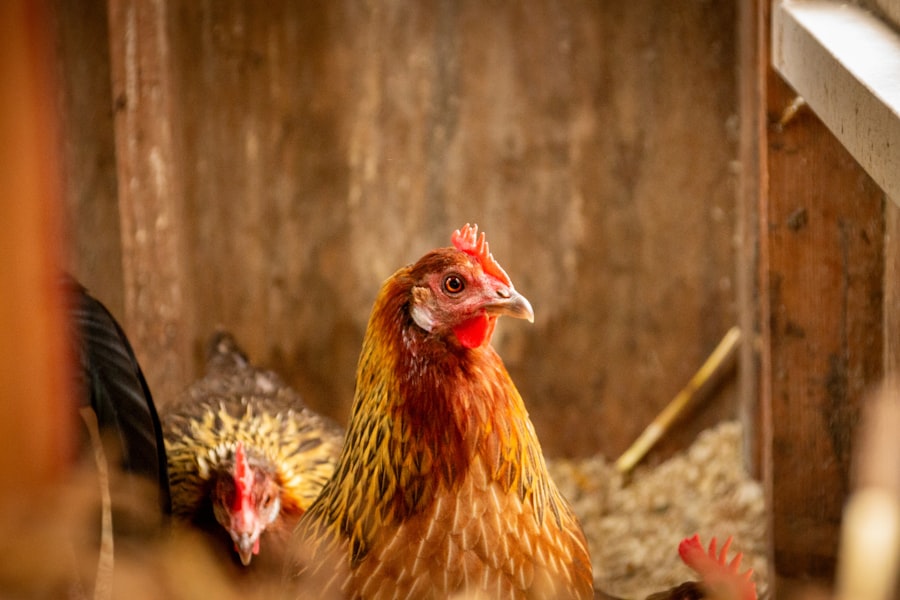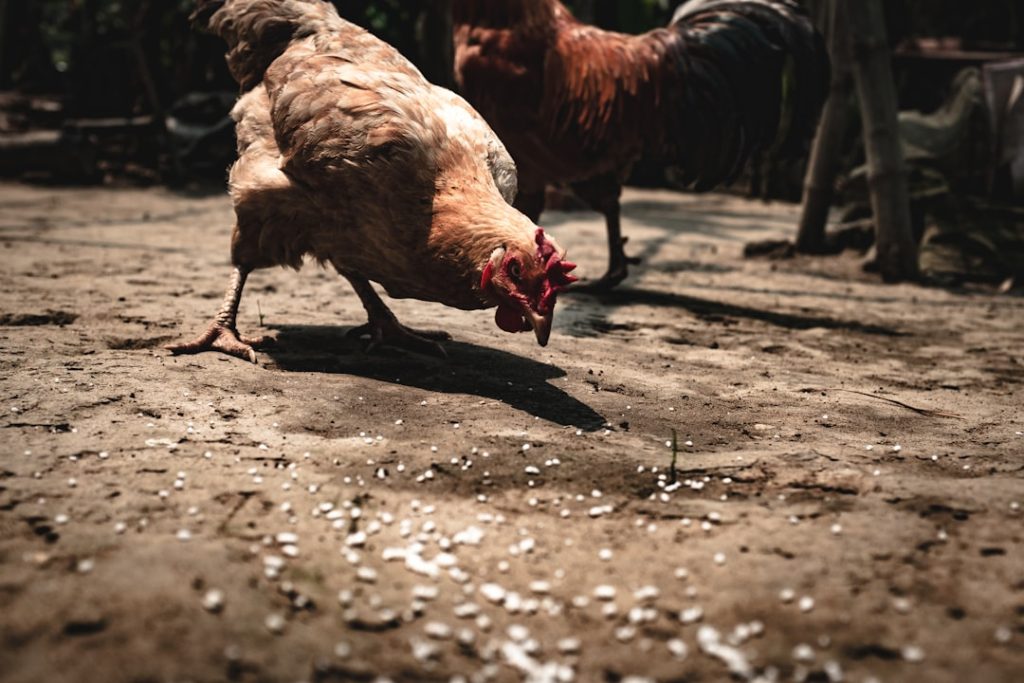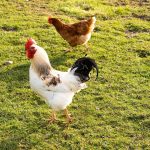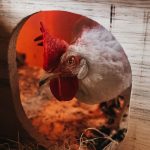Chickens are social animals that thrive in a flock environment. They have a natural instinct to roost, scratch, and peck for food. Understanding their basic needs is crucial for their well-being.
Chickens require a safe and secure living environment, access to fresh water, proper nutrition, and protection from predators. They also need space to roam and engage in natural behaviors. It’s important to provide them with a suitable living environment that meets these needs to ensure their health and happiness.
Chickens also require social interaction and mental stimulation. They are intelligent animals that benefit from enrichment activities such as dust bathing, foraging, and perching. Providing them with opportunities to engage in these natural behaviors will help prevent boredom and reduce stress.
Additionally, chickens need a clean and comfortable nesting area where they can lay their eggs. Understanding the needs of chickens is essential for providing them with a fulfilling and enriching life. Chickens are also sensitive to temperature changes and require proper ventilation and insulation in their living space.
They need protection from extreme heat and cold to maintain their health and well-being. Understanding the specific needs of chickens in relation to their living environment is crucial for creating a safe and comfortable space for them to thrive.
Table of Contents
- 1 Providing a Suitable Living Environment
- 2 Feeding and Nutrition for Chickens
- 3 Health and Wellness for Chickens
- 4 Handling and Socializing with Chickens
- 5 Predation and Protection for Chickens
- 6 Breeding and Reproduction for Chickens
- 7 FAQs
- 7.1 What are the basic requirements for keeping chickens in Starbound?
- 7.2 What kind of enclosure is suitable for keeping chickens in Starbound?
- 7.3 What do chickens eat in Starbound?
- 7.4 How do I collect eggs from my chickens in Starbound?
- 7.5 How do I protect my chickens from predators in Starbound?
- 7.6 Can I breed chickens in Starbound?
Key Takeaways
- Chickens need a balanced diet of grains, protein, vitamins, and minerals to stay healthy and productive.
- Providing a clean and spacious living environment is essential for the well-being of chickens.
- Feeding chickens a diet rich in calcium and protein is crucial for egg production and overall health.
- Regular health check-ups, vaccinations, and proper hygiene practices are important for maintaining the wellness of chickens.
- Proper handling and socialization can help chickens become more friendly and easier to manage.
Providing a Suitable Living Environment
Coop Requirements
The coop should be well-ventilated, insulated, and free from drafts to maintain a comfortable temperature for the chickens. It should also be spacious enough to accommodate the number of chickens in the flock, allowing them to move around freely and engage in natural behaviors.
Nesting Boxes and Amenities
The coop should have nesting boxes where the chickens can lay their eggs in a clean and comfortable environment. The nesting boxes should be filled with clean bedding material such as straw or wood shavings to provide a cozy space for the hens to lay their eggs. Additionally, the coop should have perches for the chickens to roost on at night, as well as areas for dust bathing and foraging.
Outdoor Space
In addition to the coop, chickens also need access to an outdoor run or free-range area where they can roam, scratch, and peck for food. The outdoor area should be securely fenced to protect the chickens from predators and provide them with a safe space to explore.
Feeding and Nutrition for Chickens

Feeding and nutrition are essential aspects of caring for chickens. A balanced diet is crucial for their health, egg production, and overall well-being. Chickens require a diet that is high in protein, vitamins, and minerals to support their growth, egg production, and immune system.
Understanding their nutritional needs is important for providing them with a diet that meets these requirements. Chickens should be fed a commercial poultry feed that is specifically formulated for their age and purpose, whether it’s for egg-laying hens or meat-producing birds. The feed should contain the necessary nutrients, including protein, carbohydrates, fats, vitamins, and minerals.
In addition to commercial feed, chickens can also be supplemented with kitchen scraps, fruits, vegetables, and grains to provide variety in their diet. Fresh water should always be available to chickens, as they require it for digestion, egg production, and overall hydration. Waterers should be kept clean and free from contaminants to ensure the chickens have access to clean water at all times.
Additionally, providing grit or oyster shells can help chickens with digestion and calcium absorption for strong eggshells. Understanding the feeding and nutritional needs of chickens is essential for maintaining their health and productivity. Providing them with a balanced diet that meets their specific requirements will ensure they have the energy and nutrients they need to thrive.
Health and Wellness for Chickens
Maintaining the health and wellness of chickens is crucial for their overall well-being. Regular health checks, proper hygiene, and disease prevention are essential aspects of caring for chickens. Understanding the common health issues that can affect chickens is important for identifying potential problems early and providing appropriate care.
Chickens should be monitored regularly for signs of illness or injury. Common health issues in chickens include respiratory infections, parasites, egg binding, bumblefoot, and nutritional deficiencies. Understanding the symptoms of these conditions can help identify when a chicken requires medical attention.
Maintaining proper hygiene in the coop is also important for preventing disease and promoting the health of the flock. The coop should be cleaned regularly to remove droppings, soiled bedding, and debris that can harbor bacteria and parasites. Additionally, providing dust baths for the chickens can help control external parasites such as mites and lice.
Preventive measures such as vaccinations, parasite control, and biosecurity protocols can help protect chickens from infectious diseases. Understanding the importance of disease prevention and implementing appropriate measures can help maintain the health and wellness of the flock.
Handling and socializing with chickens is an important aspect of caring for them. Building trust with the birds through gentle handling and positive interactions can help reduce stress and fear in the flock. Understanding how to handle chickens properly is essential for their well-being.
Chickens should be handled gently and calmly to avoid causing them distress or injury. Approaching them slowly and speaking softly can help them feel more at ease around humans. Additionally, spending time with the chickens regularly can help socialize them and build a bond of trust.
Socializing with chickens can also involve providing enrichment activities such as treats, toys, or opportunities for free-ranging. These activities can help keep the birds engaged and stimulated, reducing boredom and stress. Understanding how to handle and socialize with chickens is important for building a positive relationship with them and ensuring their well-being.
Predation and Protection for Chickens

Physical Barriers
Fencing the outdoor run or free-range area with sturdy wire mesh can help prevent predators from gaining access to the chickens. Additionally, securing the coop with locks or latches can help deter predators from entering the sleeping area at night.
Deterrents and Lighting
Providing adequate lighting around the coop can also help deter nocturnal predators such as raccoons or owls. Motion-activated lights or predator deterrent devices can help scare off potential threats.
Understanding and Preparation
Understanding the potential predators in your area and implementing appropriate protective measures can help keep chickens safe from harm. By taking these steps, you can create a safe and secure environment for your chickens to thrive.
Breeding and Reproduction for Chickens
Breeding and reproduction are natural behaviors in chickens that require careful management. Understanding the breeding process and providing appropriate care for breeding birds is important for successful reproduction. Breeding chickens should be selected based on desirable traits such as egg production, meat quality, or specific breed characteristics.
Understanding genetics and breeding principles can help breeders make informed decisions when selecting birds for mating. Providing breeding birds with a suitable nesting area where they can lay and incubate eggs is essential for successful reproduction. The nesting area should be secluded, comfortable, and free from disturbances to encourage broody hens to sit on their eggs.
Understanding the breeding behavior of chickens and providing appropriate care for breeding birds can help ensure successful reproduction within the flock. In conclusion, understanding the needs of chickens is essential for providing them with a suitable living environment, proper nutrition, health care, socialization, protection from predators, and successful reproduction. By meeting these needs, chicken owners can ensure the health, happiness, and well-being of their flock.
If you’re looking for more information on how to keep chickens in Starbound, you might want to check out this article on 10 essential tips for building a chicken coop. This article provides valuable insights on creating a suitable living space for your chickens, which is crucial for their well-being and productivity. It covers important aspects such as ventilation, insulation, and predator-proofing to ensure that your chickens are safe and comfortable.
FAQs
What are the basic requirements for keeping chickens in Starbound?
To keep chickens in Starbound, you will need a suitable enclosure with enough space for them to roam, a source of food and water, and a nesting area for them to lay eggs.
What kind of enclosure is suitable for keeping chickens in Starbound?
A fenced-in area with enough space for the chickens to move around and forage is ideal. You can also build a coop or use pre-made structures to house your chickens.
What do chickens eat in Starbound?
Chickens in Starbound can be fed with seeds, which can be purchased from merchants or found while exploring planets. You can also grow crops such as wheat or rice to feed your chickens.
How do I collect eggs from my chickens in Starbound?
Chickens in Starbound will lay eggs in their nesting area. Simply interact with the nesting area to collect the eggs.
How do I protect my chickens from predators in Starbound?
To protect your chickens from predators in Starbound, you can build a secure enclosure with fences and gates. You can also place turrets or other defensive structures to deter predators.
Can I breed chickens in Starbound?
Yes, you can breed chickens in Starbound by placing a male and female chicken in the same enclosure. They will eventually produce fertilized eggs, which can be hatched into new chicks.
Meet Walter, the feathered-friend fanatic of Florida! Nestled in the sunshine state, Walter struts through life with his feathered companions, clucking his way to happiness. With a coop that’s fancier than a five-star hotel, he’s the Don Juan of the chicken world. When he’s not teaching his hens to do the cha-cha, you’ll find him in a heated debate with his prized rooster, Sir Clucks-a-Lot. Walter’s poultry passion is no yolk; he’s the sunny-side-up guy you never knew you needed in your flock of friends!







